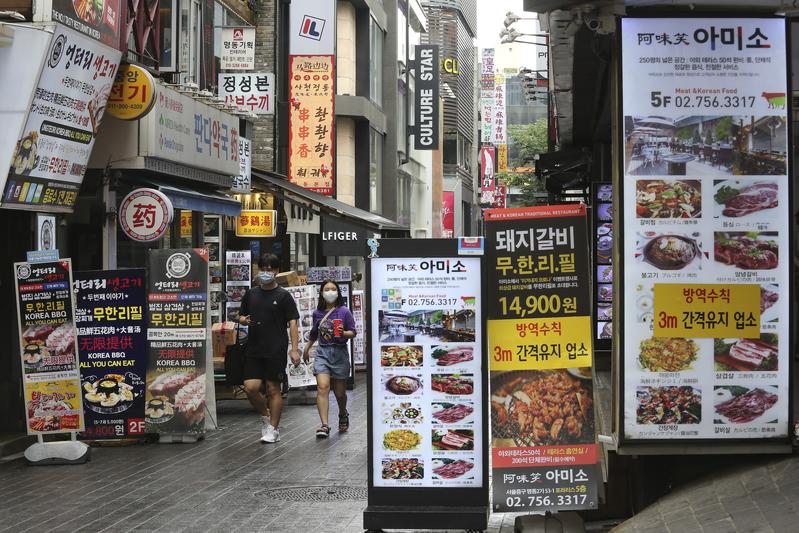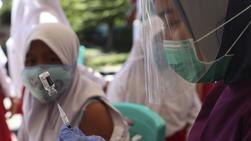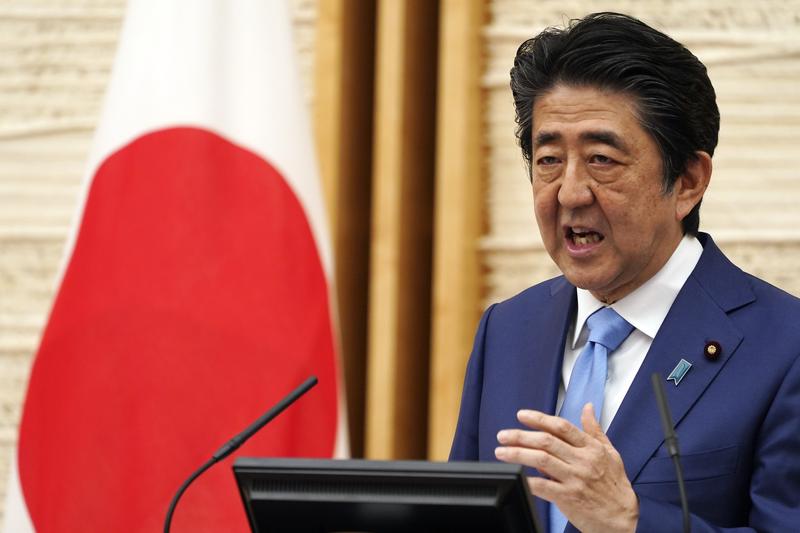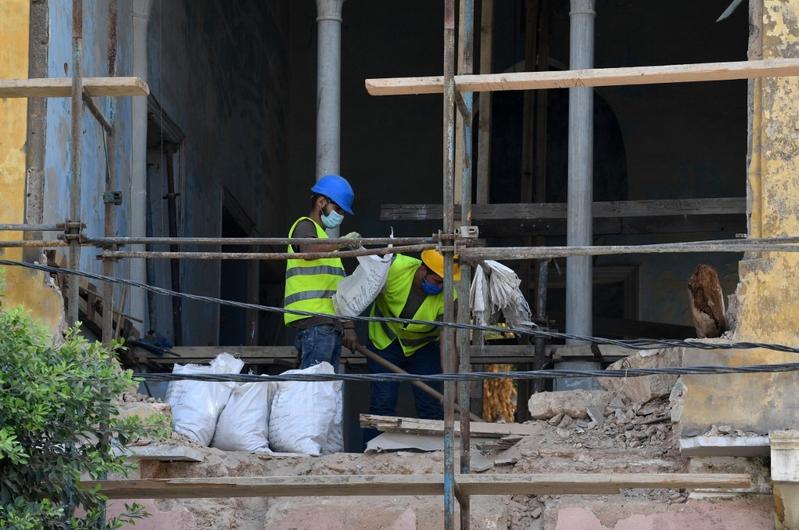 People wearing face masks to help protect against the spread of the coronavirus pass by banners showing the menu items of restaurants in Seoul, South Korea, Aug 28, 2020. (AHN YOUNG-JOON / AP)
People wearing face masks to help protect against the spread of the coronavirus pass by banners showing the menu items of restaurants in Seoul, South Korea, Aug 28, 2020. (AHN YOUNG-JOON / AP)
JERUSALEM / ANKARA / DUBAI / RAMALLAH / DOHA / JAKARTA / TOKYO / MUMBAI / SEOUL / KATHMANDU / SEOUL / TEHRAN / BANDAR SERI BEGAWAN / KABUL — South Korea announced stricter social distancing measures for Seoul, where a recent spike in coronavirus cases is raising worries of another wave that could undermine the country’s ability to manage the pandemic.
Health Minister Park Neung-hoo said restaurants in the greater Seoul area, where about half of the country’s population of 50 million live, will not be allowed to serve diners after 9 pm, while franchised cafes will only be allowed to do deliveries and pickups. Cram schools will also be banned from holding in-person classes and government agencies will be required to have more than a third of their employees work from home.
The social distancing measures, which will be imposed for a week, fall short of lockdown-like restrictions that would have been in place had the country raised its social distance alert to the highest level 3. Prime Minister Chung Sye-kyun said on Friday that the current level 2 alert would be extended for another week, as raising it to level 3 would be the country’s “last resort.”
Under level 3 social distancing, gathering of more than 10 people would be banned, schools would be shut down and sports and entertainment events would be canceled.
The latest measures, which would impact about 380,000 restaurants, come as the Asian nation has seen of cases in the triple digits for the past two weeks, peaking at 441 on Thursday. New infections fell to 371 cases on Friday. While restaurants won’t be allowed to serve customers after 9 pm, they can do deliveries and takeouts between 9 pm and 5 am.
READ MORE: South Korea warns of ‘massive’ coronavirus risk
Afghanistan
Afghanistan on Friday reported 11 new COVID-19 cases within the past 24 hours, bringing the total tally to 38,140 cases, the country's Ministry of Public Health confirmed.
"Within the past 24 hours, 153 suspected cases were tested, out of which 11 cases were tested coronavirus positive in Kabul, Bamyan and Paktia provinces of the country's 34 provinces," the ministry said in a statement.
One COVID-19 patient succumbed to the virus, taking the number of people who lost their lives to 1,402 since the outbreak of the pandemic in February.
Brunei
Brunei reported no new cases of COVID-19 on Friday with the national tally standing at 144.
According to Brunei's Ministry of Health, no more recoveries were recorded, maintaining the total number of recovered cases at 139. There are two active cases being treated at the National Isolation Center, who were recorded on Aug 19 and Aug 25 respectively.
India
India reported a record daily jump of 77,266 coronavirus infections on Friday, taking its total to 3.39 million, as cases surged across the country, data from the federal health ministry showed.
India has reported the highest single-day caseload in the world every day since Aug. 7, a Reuters tally showed, and is the third-most affected country behind only the United States and Brazil.
Deaths in the same period went up by 1,057, taking the total toll to 61,529.
 Health workers prepare to give an HPV vaccine shot to an elementary school student during a free vaccination service for school children in Jakarta, Indonesia, Aug 25, 2020. (ACHMAD IBRAHIM / AP)
Health workers prepare to give an HPV vaccine shot to an elementary school student during a free vaccination service for school children in Jakarta, Indonesia, Aug 25, 2020. (ACHMAD IBRAHIM / AP)
Indonesia
Indonesia reported its biggest rise in new coronavirus cases for a second successive day on Friday, while operations at a second factory in the country’s biggest province were scaled down following the emergence of new infection clusters.
Indonesia passed the 3,000 mark in new daily cases for the first time and added 105 new deaths, as authorities in West Java tackled outbreaks in three factories that the provincial governor said could be due to workers not following health measures.
Among those was at a plant owned by Japanese automaker Suzuki, which cut operations by half after 71 employees tested positive for the coronavirus. On Friday, Suzuki Indonesia said in a statement that it would remain at reduced capacity until conditions were safe.
The new cases brought Indonesia’s total coronavirus infections to 165,887, while 105 new fatalities took the death toll to 7,169, the data showed.
Israel
Israel's Ministry of Health reported 2,000 new COVID-19 cases on Thursday, bringing the total infections to 110,403.
The total number of deaths reached 884 with the addition of nine more fatalities, while the number of patients in serious condition rose from 404 to 409, out of 846 patients currently hospitalized.
The number of recoveries reached 87,726, with 1,260 new recoveries, while the number of active cases increased to 21,793.
The ministry also banned the UEFA Europa League match between Israel's Maccabi Haifa and FK Zeljeznicar Sarajevo of Bosnia, which was scheduled to be played on Thursday evening in the northern city of Haifa.
Iraq
Iraq's total number of COVID-19 cases approached 220,000 on Thursday with the addition of 3,651 new infections. Meanwhile, the tally of coronavirus cases in Israel surpassed 110,000 as the COVID-19 resurgence continued.
Iraq's Health Ministry reported that the total number of infections in the country climbed to 219,435, while the death toll surged to 6,740 after 72 more deaths were confirmed.
Iran
Iran's health ministry on Friday reported an overnight registration of 2,115 infections with novel coronavirus which brought the total infections to 369,911 in the country since February.
Sima Sadat Lari, spokeswoman for Iran's Ministry of Health and Medical Education, said at her daily briefing that out of the new cases, 941 have been hospitalized.
The pandemic has so far claimed 21,249 lives in Iran, up by 112 in the past 24 hours, said Lari.
ALSO READ: Iran faces shortage of medics, beds as virus cases spike again
 In this May 4, 2020, file photo, Japan's Prime Minister Shinzo Abe speaks during a press conference at his official residence in Tokyo. Japan’s NHK and other media say Aug 28, 2020, Prime Minister Shinzo Abe has expressed his intention to step down, citing his health. (EUGENE HOSHIKO / AP)
In this May 4, 2020, file photo, Japan's Prime Minister Shinzo Abe speaks during a press conference at his official residence in Tokyo. Japan’s NHK and other media say Aug 28, 2020, Prime Minister Shinzo Abe has expressed his intention to step down, citing his health. (EUGENE HOSHIKO / AP)
Japan
Japanese Prime Minister Shinzo Abe announced new measures to fight the coronavirus pandemic on Friday, including boosting testing capability to 200,000 tests per day and aiming to secure enough vaccines for all citizens by mid-2021.
Abe also said that Japan will allow foreigners with residence status to enter the country from the start of next month.
Japan is making an aggressive move to grab enough coronavirus vaccine to inoculate its population four times over, a push the government hopes will instil confidence that it can host a delayed summer Olympics next year.
Like other rich countries, Japan is signing multiple deals because some of the vaccines could fail in clinical trials or require more than one dose, an approach some experts consider prudent.
But Japan has something else riding on a successful mass rollout of a vaccine: Prime Minister Shinzo Abe's enduring aim to bring thousands of athletes and fans to Tokyo for the Games in 2021, after the event fell through this year due to the pandemic.
Japan is on track to have 521 million doses of five different vaccines in 2021, compared with a population of 126 million. Recent deals include global arrangements with such drugmakers as Pfizer Inc and AstraZeneca PLC, as well as local deals with the likes of Shionogi & Co.
Kazakhstan
Kazakhstan will relax more quarantine restrictions from Aug 31 as the country's epidemiological situation has improved, the Kazakh Prime Minister's Office has said in a statement.
According to the health ministry, weeks of strict restrictions have yielded significant results, with the COVID-19 infection rate falling by 10 times compared with its peak season, while the number of ambulance calls has fallen by 4.2 times and the occupancy of beds by 80 percent.
Based on the current situation, the Interdepartmental Committee under the Kazakh government decided to loosen more restrictive measures, the statement said.
Starting from Aug 31, religious sites, swimming pools, fitness centers, cultural facilities and national parks will be allowed to reopen with limited opening hours and visitors. Bus services between cities and regions will also be restored.
Kuwait
In Kuwait, the tally of COVID-19 cases increased by 674 to hit 82,945, including 522 deaths and 74,522 recoveries.
Currently, 7,901 patients are receiving treatment, including 97 in ICU, the Kuwaiti health ministry said.
 Young volunteers on Aug 26, 2020, install scaffolding on the outer walls of a house in the neighbourhood of Mar Mikhael near the port of Beirut, damaged in the Aug 4 massive explosion. (PHOTO / AFP)
Young volunteers on Aug 26, 2020, install scaffolding on the outer walls of a house in the neighbourhood of Mar Mikhael near the port of Beirut, damaged in the Aug 4 massive explosion. (PHOTO / AFP)
Lebanon
Lebanon's number of COVID-19 infections increased on Thursday by 689 cases to 14,935, while the death toll went up by seven to 146.
Lebanese caretaker Health Minister Hamad Hassan urged citizens to take precautionary measures while warning that the number of beds available for COVID-19 patients in Lebanese hospitals does not exceed 200.
Malaysia
Malaysia will continue with certain movement control restrictions to contain the spread of the coronavirus until Dec 31, Prime Minister Muhyiddin Yassin said on Friday.
Malaysia has seen a significant decline in the number of virus cases, reporting only 10 new cases on Friday. It has gradually reopened nearly all businesses, but with social distancing protocols. Large gatherings are banned and international borders remain closed.
In a televised address, Muhyiddin said while the Southeast Asian nation had the virus under control, the spread of the virus globally meant “it will be a long time before our country is free from the dangers of COVID-19.”.
The economy has shown positive signs of recovery, he added.
Myanmar
The number of COVID-19 cases reached 602 in Myanmar on Thursday while local transmissions are increasing, according to a release from the Health and Sports Ministry.
Sixteen laboratory confirmed cases, including four imported cases, were reported on Thursday night.
New Zealand
New Zealand confirmed 12 new cases of COVID-19 on Friday, including five new cases in the community which were all linked to the Auckland cluster.
Seven new imported cases include three men in their 30s, a woman in her 60s, a woman in her 20s, and two children. They all arrived in New Zealand on Aug. 23 on the same Air India flight from Delhi, and tested positive around the third day of their stay in managed isolation, according to the Ministry of Health.
Of the five community cases reported, four are from one household and are linked to the Mt Roskill Evangelical Church sub-cluster, said a ministry statement. The other case is epidemiologically linked to a confirmed case, it said.
Nepal
The Nepali government reported the record high single day spike in COVID-19 cases on Thursday as the Himalayan country witnessed over 1,100 cases in the last 24 hours.
"With 1,111 new cases in the last 24 hours, total COVID-19 cases reached 35,529," Jageshwor Gautam, spokesperson at the Ministry of Health and Population, told a press conference.
Oman
Oman's Health Ministry on Thursday reported 187 new COVID-19 cases, raising the tally of confirmed cases in the Sultanate to 85,005, including 650 deaths and 79,608 recoveries.
The ministry urged everyone to adhere to social distancing instructions issued by the Supreme Committee and the ministry of health, as well as staying home and avoiding going out unless necessary.
Palestine
Palestine reported 622 new COVID-19 cases and six more fatalities, raising the total infections to 27,386 and the death toll to 158 in the Palestinian territories.
Qatar
Qatari Health Ministry on Thursday announced 246 new COVID-19 infections, raising the total number of confirmed cases in the Gulf state to 117,988.
Meanwhile, 239 more recovered from the virus, bringing the total recoveries to 114,797, while the total fatalities increased by one to 195, the ministry said.
Saudi Arabia
Saudi Arabian Health Ministry reported 1,019 new coronavirus cases, taking the tally of infections to 311,855, as the death toll soared to 3,785 with the addition of 30 new fatalities.
The total number of recoveries in the kingdom increased to 286,255, after 1,310 more patients recovered from the disease.
The Philippines
The number of confirmed COVID-19 cases in the Philippines surged to 209,544 after the Department of Health (DOH) reported 3,999 new daily cases on Friday.
The DOH said that the number of recoveries surged to 134,474 after it reported 510 more patients who have survived the disease.
The death toll also climbed to 3,325 after 91 more patients have succumbed to the viral disease, the DOH added.
Metro Manila topped the five regions or provinces with the highest number of daily confirmed cases reported on Friday at 2,097, followed by Laguna province, south of Manila, 178; Cavite province, south of Manila, 138; Batangas province, south of Manila, 132; and Cebu province in the central Philippines, 125.
Health Undersecretary Maria Rosario Vergeire said that 6,735 healthcare workers, mostly nurses, and doctors, have contracted the virus, adding that 40 have succumbed to the disease.
The DOH has tested over 2.27 million people so far.
Turkey
Turkey reported 1,491 new COVID-19 cases on Thursday, raising the total diagnosed cases to 263,998, Turkish Health Minister Fahrettin Koca said.
Meanwhile, 26 people died in the past 24 hours, taking the death toll to 6,209, Koca tweeted.
Turkish health professionals conducted 106,111 tests in the past 24 hours, bringing the overall number of tests to 6,727,860, the minister said.
UAE
The United Arab Emirates (UAE) on Thursday announced 491 new COVID-19 cases, bringing the total confirmed cases in the country to 68,511.
At the same time, 402 more patients recovered from the virus, taking the tally of recoveries in the UAE to 59,472, UAE's Ministry of Health and Prevention said, adding that the death toll remained unchanged at 378.


